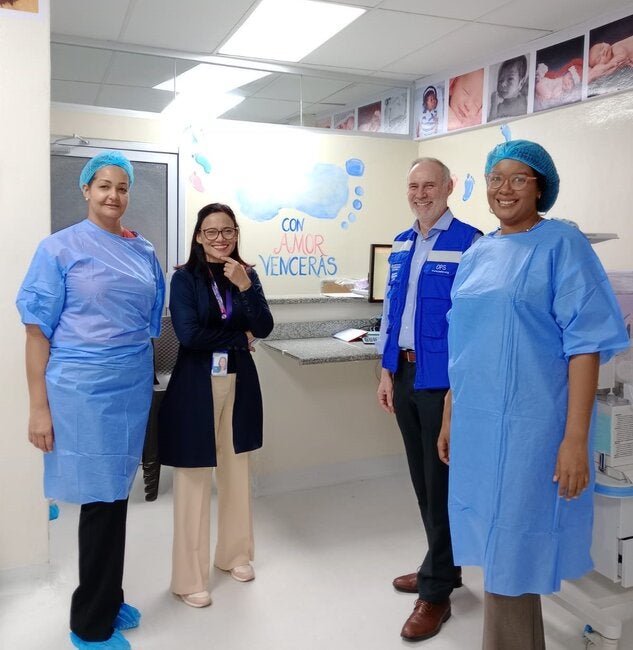
Montevideo August 20, 2024. In 2023, with the support of the Latin American Center for Perinatology - Women's and Reproductive Health (CLP/WR), the Dominican Republic developed a Plan to accelerate the reduction of neonatal mortality in the country. Over a year after the plan was launched, the regional advisor on Perinatal Health of the Pan American Health Organization (PAHO), Pablo Durán, made a technical visit to provide support in the follow-up and identification of opportunities for improvement.
During meetings with the Dominican Ministry of Health and PAHO team, progress and persistent challenges were analyzed. In addition, in coordination with the National Health Service, the neonatal health units of the Maternidad Nuestra Señora de la Altagracia University Teaching Hospital and the San Lorenzo de Los Mina Maternal-Child Hospital were visited.
Among the aspects prioritized, the actions implemented for the prevention of Respiratory Syncytial Virus and its complications were evaluated; the incorporation of screening for visual and hearing deficiencies; and the promotion of integral and humanized care for premature newborns and their mothers.
In addition, the urgency of making greater progress on issues such as prevention, surveillance and response to congenital defects and neonatal sepsis was recognized, for which the need to develop and update protocols, with emphasis on Primary Health Care (PHC), was raised.
The PAHO advisor highlighted the importance of countries having updated plans and protocols for the reduction of neonatal mortality and emphasized the commitment of the Dominican Republic. “We know that challenges persist, but it is very important that the country is taking actions to improve and meet the established goals.” In this regard, he noted that joint work continues and follow-up meetings have been coordinated. “The idea is to have a detailed report regarding the progress of the plan and the challenges that exist at the end of the year.”
Low-cost interventions that make a difference
“Primary health care is a fundamental pillar for improving health, not only for the newborn, but also before and during pregnancy. PHC can prevent many conditions that can affect health during pregnancy and that will have repercussions at the time of birth and in the development of the baby,” said the PAHO advisor.
Durán also explained that there are very simple and low-cost practices that are fundamental for the optimal development of newborns. “Breastfeeding is the most cost-effective intervention, and it is not only the provision of food, it is the provision of care and affection, it is the transmission of defenses so that the baby does not develop infections later on".
Breastfeeding from the moment immediately after birth, timely ligation of the umbilical cord and immediate skin-to-skin contact with the mother are the three interventions that the consultant highlighted and on which he mentioned that we must continue to advocate. “Sometimes we think that it is not necessary to continue to insist on these issues, but the evidence shows that yes, it is essential to continue to advocate so that there are no setbacks and so that we can continue to move forward”. For this, PHC plays an extremely important role and all health professionals must be adequately trained to promote these interventions.
In addition, Durán pointed out that when a baby is discharged home, the bond must continue and accompaniment of the family and the baby is required at the first level of care and from the perspective of primary health care. “Communication between the neonatology and maternity wards and the families is essential so that both healthy babies and those who were born prematurely or who presented some complexity, have their controls and the appropriate follow-up.” Accompanying families, supporting breastfeeding, promoting hygiene and proper hand washing to prevent infections are fundamental aspects that require the involvement of the first level of care.
The Dominican Republic is committed to expanding and improving PHC in order to improve the quality of care for its population and, in particular, for mothers and newborns.




